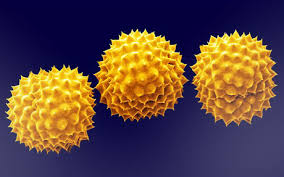 Pollen Over the counter and prescription allergy remedies can often help relieve the symptoms of allergies but sometimes cause side effects that are worse then the symptoms you are trying to conquer. They can make your heart race, make you feel sluggish, make your head feel fuzzy (you can't drive), interrupt your sleep and dehydrate your sinus membranes and mouth to the point it feels like the Mohave dessert. Here are 10 terrific tips to relieve your allergies: 1. Stop drinking milk - it is a huge mucus maker adding insult to injury where allergies are concerned. Instead switch to rice, almond, coconut or soy milk. They are fortified with calcium, vitamin D and are Lactose free another culprit. 2. Reduce or eliminate wheat from your diet. Wheat is the number one cause of allergies and illness. Most groceries stores now have a gluten free section and advances have made the products tasty. Trader Joe's and Wholefoods are your best bets for good gluten free breads and wheat free waffles a nice substitute and treat. 3. Check the daily Pollen Count (Has Articles) in your community. Modify your daily activities, you may not want to go jogging if the count is especially high. Another Local Pollen Count local site. 4. Stay Hydrated - Drinking plenty of water will not only hydrate you but will help flush out toxins. You can use a Neti pot often for nasal irrigation to flush out the pollen and stop the irritation. 5. A teaspoon of local raw honey twice a day will boost your immune system and soothe your itchy throat. The latest on honey is Manuka Honey from New Zealand which has a higher rating of enzymes then regular honey and 4 times nutritional content then regular honey. You can get it a Trader Joe's for $19 (has a rating of +10). This may be high for honey, but it is a better price then $60 at health food stores and better then $44 on Amazon! See Boost you immune system, save money on honey and apply it to a facial! 6. Quercetin - A natural antioxidant, anti-decongestant and antihistamine, is found in fruits (such as apples, red grapes and grapefruit) and vegetables (such as onions) and other plant-based foods (such as tea). It helps stop the body's immune cells from releasing histamines, the inflammatory chemicals that cause allergy symptoms. 7. Bromelain.This enzyme found in pineapples is a powerful anti-inflammatory that relieves swelling (especially in the nose and sinuses) and aching joints. 8. Vitamin C - A natural immune-system booster, vitamin C (ascorbic acid) has the additional benefit of acting as a mild antihistamine. Histamine levels were significantly reduced when blood levels of vitamin C rose, according to 1990s research on allergy remedies at Arizona State University. 9. Eucalyptus - This sharply fragrant leaf (Eucalyptus globulus) thins mucus and is excellent for a deep, heavy cough. Add up to five drops of eucalyptus oil in a vaporizer (or some boiling water) and inhale deeply.You can also take a warm shower using the oil. Or for added therapy, burn a eucalyptus candle to fill the air with its aroma. 10. Identifying the actual source of your allergy will assist you in taking better steps in relieving your symptoms. You may think you have hay fever but it could actually be something else. You should see a doctor and have an allergy test. Pin pointing the cause can also help you in managing. For example: I have allergies and have been tested by an allergist. When the doctor asked me what my worst time of the allergy season was I told him the third week of May. He then told me I was allergic to oak and sure enough the test panned out. During the 3rd week of May I am diligent about my eating habits (No Dairy Products and Gluten Free) and I make sure that I take my supplements. It all helps. Whatever you choose, do it with consistency. I hope this will help you breath easier. Let me know your thoughts about this article. |